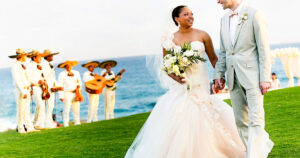
Preparing for a destination wedding can be exciting, but it can also be overwhelming. Here are some tips to help you prepare:
Set a budget
Determine how much you are willing to spend on the wedding and stick to it. Keep in mind that destination weddings can be more expensive than traditional weddings.
Here are some steps you can follow to set a budget for a destination wedding:
Determine the location: The first step in setting a budget for a destination wedding is to choose the location. Consider the cost of travel, accommodations, and other expenses associated with the location.
Make a guest list: Determine the number of guests you plan to invite and consider the cost of their travel and accommodations. Keep in mind that many guests may decline due to the cost or inconvenience of traveling to a destination wedding.
Consider the wedding package: Many resorts and venues offer wedding packages that include everything from the ceremony and reception to the catering and decorations. Consider the cost of these packages and whether they fit within your budget.
Research vendors: If you plan to hire vendors such as photographers, florists, and DJs, research local vendors in the area and factor in their fees.
Determine additional expenses: Don’t forget to factor in additional expenses such as transportation, excursions, and any other activities you plan to include in your destination wedding celebration.
Set a budget: Based on the above factors, set a budget that includes all of the expenses associated with your destination wedding. Make sure to leave some wiggle room for unexpected expenses.
Stick to your budget: Once you have set your budget, make sure to stick to it as much as possible. Monitor your spending and adjust your budget as necessary to avoid overspending.
Choose the location
Choose a location that is meaningful to you and your partner. Consider the accessibility of the location for your guests, as well as the weather, season, and local culture.
Here are some tips to help you choose the best location for your special day:
Consider your budget: The first thing to consider when choosing a destination wedding location is your budget. Decide how much you can afford to spend on the venue, travel, and accommodations for you and your guests.
Think about the weather: Research the weather patterns of your potential locations. Consider if the weather during your wedding month would be pleasant or if it would be rainy or uncomfortably hot.
Consider the travel requirements: Think about the ease of travel for you and your guests. Look at the availability of flights, the distance from the airport to the venue, and whether guests will need visas or vaccinations to travel to the location.
Think about the guest list: Consider the size of your guest list and choose a venue that can comfortably accommodate your guests.
Look at venue options: Consider the type of venue you want for your wedding, such as a beachfront resort, a vineyard, or a historic mansion. Research venues that fit your criteria and compare prices.
Consider local laws and regulations: Be aware of any local laws and regulations that may affect your wedding plans. For example, some countries require a waiting period before a wedding can take place, while others require specific documentation.
Take in the culture and scenery: Think about the local culture and scenery of the location you are considering. Consider if you and your guests would enjoy exploring the area and experiencing the local cuisine and activities.
Plan ahead
Start planning your destination wedding at least a year in advance to give yourself enough time to research and make arrangements.
Here are some tips on how to plan ahead for a destination wedding:
Set a budget: Before you start planning, determine how much money you have to spend. This will help you narrow down your choices and make decisions based on what you can afford.
Choose a destination: Pick a location that you and your partner both love and that is easily accessible for your guests. Consider the weather, the time of year, and any cultural or logistical considerations that may impact your wedding plans.
Research local vendors: Look for reputable vendors, such as wedding planners, photographers, and caterers, in your chosen destination. Read reviews, compare prices, and schedule consultations to get a sense of their style and availability.
Send save-the-dates early: Since a destination wedding requires more time and planning for your guests, it’s essential to give them as much notice as possible. Send save-the-dates at least six to eight months in advance to allow them to plan and make travel arrangements.
Plan group activities: Consider planning group activities or excursions for your guests, such as a welcome dinner, a guided tour, or a beach day. This will help create a sense of community and make your guests feel more involved in your wedding festivities.
Consider hiring a wedding planner: A destination wedding can be more complicated to plan, especially if you’re unfamiliar with the local customs and regulations. Hiring a wedding planner who specializes in destination weddings can help you navigate the process and ensure that everything runs smoothly on your big day.
Prepare for the unexpected: Always have a backup plan in case of inclement weather or other unforeseen circumstances. You might consider getting an Event Management Mobile App to keep everything in order. Consider purchasing wedding insurance to protect your investment and give you peace of mind.
Hire a wedding planner
A wedding planner can be very helpful in planning a destination wedding, especially if you are not familiar with the location.
Here are a few reasons why you might consider hiring a wedding planner:
Expertise: Wedding planners have experience planning weddings and are familiar with the entire process from start to finish. They can offer advice and guidance on everything from selecting the perfect venue to choosing the right vendors to fit your budget.
Time-saving: Planning a wedding can be a time-consuming task, especially if you are working full-time or have other obligations. Hiring a wedding planner can save you valuable time and energy, allowing you to focus on other aspects of your life.
Stress reduction: Planning a wedding can be stressful, and having a professional planner to handle the details can help alleviate some of that stress. They can take care of the logistics, keep everything organized, and handle any unexpected issues that may arise.
Budget management: A good wedding planner can help you stick to your budget and find creative ways to save money while still creating a memorable experience for you and your guests.
Attention to detail: A wedding planner can take care of all the small details that can be easily overlooked, such as seating arrangements, vendor coordination, and timeline management.
Notify your guests
Let your guests know about your wedding well in advance so they have time to plan and make travel arrangements.
There are several ways to notify your guests about your destination wedding:
Save the Dates: Send out Save the Date cards as soon as you have finalized your wedding date and venue. This gives your guests plenty of time to make travel arrangements and take time off work.
Wedding Website: Create a wedding website that provides all the necessary details about your wedding, including the date, time, location, accommodation options, and travel information. You can include the website address on your Save the Dates or invitations.
Invitations: When sending out your invitations, make sure to include all the essential details, such as the date, time, and location of the wedding, along with any relevant travel information, like recommended airports or transportation options.
Social Media: Share information about your destination wedding on your social media platforms, like Facebook or Instagram. This is an easy way to keep your guests up-to-date with any changes or updates.
Personalized Emails: Consider sending personalized emails to your guests with all the necessary details about your destination wedding, including travel and accommodation information, and any activities or events you have planned.
Travel Agent: If you are working with a travel agent, they can help notify your guests about your destination wedding and assist them in making travel arrangements.
Remember, it’s essential to give your guests as much information as possible, so they can make informed decisions about attending your wedding. Be sure to include all the relevant details and communicate regularly with your guests leading up to the big day.
Consider the legal requirements
Be aware of the legal requirements for getting married in your chosen location. Some destinations may require specific documentation or residency requirements.
Here are some general considerations:
Marriage License: In most countries, a marriage license is required to get legally married. The requirements for obtaining a marriage license vary from country to country. In some cases, you may need to be a resident of the country for a certain period of time before you can apply for a marriage license. It’s important to research the specific requirements for the location where you plan to get married.
Documentation: You will typically need to provide certain documents to obtain a marriage license, such as a passport, birth certificate, and divorce or death certificate (if applicable). You may also need to have these documents translated into the local language.
Witnesses: Some countries require witnesses to be present at the wedding ceremony. It’s important to check the specific requirements for the location where you plan to get married.
Legalization: Depending on the country, you may need to have your marriage certificate legalized in order for it to be recognized in your home country. This may require additional steps such as obtaining an apostille or having the certificate translated.
Local laws: It’s important to research the local laws and customs of the country where you plan to get married. For example, some countries have specific requirements around who can officiate a wedding ceremony or what type of ceremony is legally recognized.
Plan activities for your guests
Consider planning activities for your guests before and after the wedding to make the most of their trip and to show them around the area.
Here are some steps you can take to plan activities for your wedding guests:
Consider your guests: Think about the ages, interests, and preferences of your guests. If you have a lot of families with children, you may want to plan some kid-friendly activities. If your guests are mostly older adults, you may want to plan something more relaxed and low-key.
Choose a location: Decide on a location for your activities. It could be at the wedding venue, a nearby park, or a local attraction. Make sure the location is convenient for your guests and that it can accommodate the number of people you expect.
Plan the activities: There are many different types of activities you can plan for your wedding guests, including:
- Outdoor games: Set up some outdoor games like cornhole, giant Jenga, or horseshoes for your guests to enjoy.
- Photo booth: Rent a photo booth or set up a DIY photo booth with props for your guests to take fun photos.
- Scavenger hunt: Plan a scavenger hunt for your guests to explore the area and find hidden treasures.
- Dance lessons: Hire a dance instructor to teach your guests some basic dance moves or a specific dance style.
- Local tours: Organize a tour of the local area to give your guests a chance to see the sights and learn more about the area.
- DIY crafts: Set up a DIY craft station where your guests can create something to take home as a memento of your special day.
- Communicate the activities: Make sure to communicate the planned activities to your guests well in advance so they can plan accordingly. Include the details in your wedding invitations or create a separate itinerary for the weekend.
- Enjoy the day: On the day of your wedding, relax and enjoy the activities with your guests. Take plenty of photos to remember the special moments and have fun!
Pack appropriately
Pack for the climate and location of your destination wedding. Bring any necessary items such as wedding attire, sunscreen, insect repellent, and medications.
Here are some tips to help you pack appropriately for a destination wedding:
Check the dress code: Find out the dress code for the wedding, as well as any events that may be taking place before or after the wedding day. This will help you decide what types of outfits you need to pack and ensure that you are appropriately dressed for each occasion.
Pack versatile outfits: Choose outfits that can be dressed up or down, so you can wear them for different events during your trip. This will help you save space in your luggage and reduce the number of items you need to pack.
Don’t forget the essentials: Make a checklist of all the essential items you need for a wedding, such as formal shoes, jewelry, and a clutch or small purse. Pack these items first to ensure that you have them on hand.
Bring appropriate footwear: Depending on the venue and location of the wedding, you may need to bring different types of footwear, such as dress shoes or sandals. Consider the terrain and weather conditions to ensure that you have appropriate footwear for each event.
Consider the climate: Check the weather forecast for your destination and pack clothing accordingly. If you’re traveling to a warm location, pack lightweight fabrics that will keep you cool, while colder destinations may require warmer clothing and layers.
Leave space for gifts: If you plan on bringing a gift for the couple, leave some extra space in your luggage to accommodate it. You may also want to consider shipping the gift to the wedding venue ahead of time to avoid the hassle of traveling with it.
Plan for the unexpected: Pack a small first-aid kit, extra batteries, chargers, and any medications you may need. It’s also a good idea to bring a backup outfit in case of spills or wardrobe malfunctions.
Plan for unexpected costs
Be prepared for unexpected costs, such as taxes, transportation, and gratuities.
Here are some tips on how to plan for unexpected costs at a destination wedding:
Create a Budget: Start by creating a budget for your wedding, including all expected expenses such as travel, accommodations, food, and entertainment. Make sure to leave some wiggle room in your budget for unexpected expenses.
Research the Destination: Before you choose your destination, do your research on the local cost of living, exchange rates, and any taxes or fees that might be added to your expenses. This will give you a better idea of what to expect in terms of costs.
Consult with a Travel Agent: A travel agent can help you plan your wedding and find the best deals on flights, accommodations, and other expenses. They can also provide valuable advice on how to save money and avoid unexpected costs.
Plan for Extra Guests: It’s not uncommon for guests to bring a plus one or for unexpected guests to show up. Be prepared for this by planning for a few extra people and adding them to your budget.
Plan for Contingencies: It’s always a good idea to have a contingency plan in case of emergencies, such as illness or natural disasters. Consider purchasing travel insurance and having a backup plan in case something unexpected happens.
Communicate with Your Guests: Make sure your guests are aware of any expected costs and provide them with a detailed itinerary and list of expenses so they can plan accordingly.
Enjoy your wedding day
Remember to enjoy your wedding day and the experience of getting married in a beautiful destination.
Here are some tips to help you do just that:
Plan ahead: Make sure you have a clear plan for the day so that you can relax and enjoy the moment without worrying about the details. Make a timeline of the day’s events and share it with your wedding planner, wedding party, and family members.
Surround yourself with positive people: Make sure your wedding party and family members are people who support and uplift you. Having a positive and loving atmosphere will make the day much more enjoyable.
Take time for yourself: Take some time to reflect on the meaning of the day and take a few deep breaths. It’s also a good idea to take a few moments alone with your partner to soak in the moment.
Eat, drink, and be merry: Make sure you eat a good breakfast and stay hydrated throughout the day. At the reception, make sure to enjoy the food and drinks and dance the night away!
Let go of perfection: Remember that no wedding is perfect, and there may be small hiccups throughout the day. Try to let go of any expectations of perfection and focus on the love and joy of the day.
Capture the moment: Take a few moments throughout the day to step back and soak in the moment. Take mental pictures or snap some photos to remember the day.
Be present: Most importantly, try to be present in the moment and enjoy every second of the day. Don’t let stress or worry distract you from the beauty of the moment.

